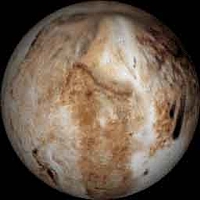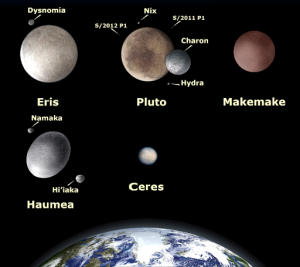The case of Pluto
 There is still time to mention one more detail: since it is not worth dwelling on the fact that planets have no influence on us, I want to highlight an aspect that ends up bringing astrology down even further. On August 24, 2006, the International Astronomical Union (IAU) issued resolutions regarding the official definition of "planet" due to controversies generated by the discovery of certain objects beyond Pluto.
There is still time to mention one more detail: since it is not worth dwelling on the fact that planets have no influence on us, I want to highlight an aspect that ends up bringing astrology down even further. On August 24, 2006, the International Astronomical Union (IAU) issued resolutions regarding the official definition of "planet" due to controversies generated by the discovery of certain objects beyond Pluto.
The result was that our Solar System today consists of 8 planets - Mercury, Venus, Earth, Mars, Jupiter, Saturn, Uranus and Neptune - 5 dwarf planets - Pluto, Ceres, Eris, Makemake, Haumea - and the minor bodies of the Solar System. Pluto was demoted from its "planet" status and is now classified as a "dwarf planet" along with Ceres (previously the largest asteroid in the belt between Mars and Jupiter), Eris, Makemake and Haumea (the latter being farther away than Pluto).
To be or not to be a planet... that is the question
 What can astrology say about this? They have got into trouble. Either they admit that in the 76 years that Pluto was considered a planet they were wrong, and they should not have considered it in their "calculations", or they admit that they were also wrong because in this time they should have considered Ceres, Eris, Makemake and Haumea, since they supposedly also "influence" people. Although the simplest thing would be to recognize that there are *millions* of objects lurking in the Solar System, that defining what is called a "planet", "dwarf planet", "satellite" or "asteroid" only has to do with a series of technicalities and only helps us to better classify our Universe, but even better, to recognize that "cosmic influences" are nonexistent and are based on arbitrary data.
What can astrology say about this? They have got into trouble. Either they admit that in the 76 years that Pluto was considered a planet they were wrong, and they should not have considered it in their "calculations", or they admit that they were also wrong because in this time they should have considered Ceres, Eris, Makemake and Haumea, since they supposedly also "influence" people. Although the simplest thing would be to recognize that there are *millions* of objects lurking in the Solar System, that defining what is called a "planet", "dwarf planet", "satellite" or "asteroid" only has to do with a series of technicalities and only helps us to better classify our Universe, but even better, to recognize that "cosmic influences" are nonexistent and are based on arbitrary data.
Physics recognizes four forces that govern the entire Universe, called fundamental forces: strong and weak nuclear interaction, gravity and electromagnetism. By doing some analysis, it is not difficult to realize that the force of a finger rocking a baby's cradle exerts much more "influence" than that of any planet millions of kilometers away.
The topic goes a long way, but it would be unnecessary to continue. With these reasonings it should be clear why the horoscope is not valid, as well as astrology in general. This ancient mixture of science, religion and beliefs slowly split over time, and although astrology is still important historically due to its origin practically simultaneous with astronomy, the latter took its own path and is what tells us today the scientific reality about the celestial bodies, of which we marvel so much.

